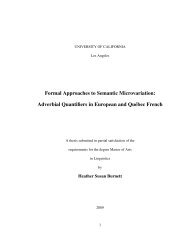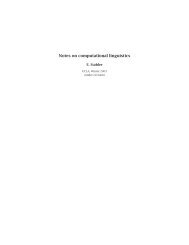A Grammar of Miya - UCLA Department of Linguistics
A Grammar of Miya - UCLA Department of Linguistics
A Grammar of Miya - UCLA Department of Linguistics
Create successful ePaper yourself
Turn your PDF publications into a flip-book with our unique Google optimized e-Paper software.
208<br />
ndyaan<br />
patg<br />
'all'<br />
'all'<br />
A <strong>Grammar</strong><strong>of</strong><strong>Miya</strong><br />
ndyaan sgbg ; silbg ndyaan<br />
patg silbg<br />
5. Temporal Nominals, Adverbs, and Pro-Forms<br />
Following are the main temporal words <strong>of</strong> <strong>Miya</strong>:<br />
coonakil(n)<br />
mJmi<br />
sliwa<br />
wfy tsuway<br />
bgna<br />
bgna nalci<br />
ataa tir naa SllWa<br />
funa Mna<br />
dabaja<br />
haa wiya mUku<br />
heevgmi<br />
aashiyf<br />
wasan<br />
matsawa<br />
amUkwa<br />
hacaawliw<br />
tsuway<br />
mUkwa<br />
rodza<br />
camaza<br />
mukwanaX<br />
eewuya<br />
'now'<br />
'today'<br />
'tomorrow'<br />
'day after tomorrow'<br />
'yesterday'<br />
'day before yesterday'<br />
'last month'<br />
'next month'<br />
'this year'<br />
'next year'<br />
'last year'<br />
'olden times, the past'<br />
'(during) the raining season'<br />
'(during) the harvest season'<br />
'(during) the dry season'<br />
'(in the) early morning'<br />
'(in the) morning'<br />
'(at) midday'<br />
'(in the) afternoon'<br />
'at night'<br />
'(on) the day thatl<strong>of</strong>X'<br />
'some day, (at) some later time'<br />
<strong>Miya</strong> has also borrowed some temporal words from Hausa:<br />
bazara<br />
'aziliar<br />
kUllum<br />
160kaciy<br />
karree<br />
'hottest part <strong>of</strong> the dry season'<br />
'early afternoon'<br />
'always'<br />
'time'<br />
'o'clock'<br />
'all the people'<br />
'all the people'<br />
lit. "some morning"<br />
lit. "that yesterday"<br />
lit. "on month <strong>of</strong> yesterday"<br />
lit. "month <strong>of</strong> tomorrow"<br />
?lit. "until some day/sun"<br />
cf. washasham 'year'<br />
ef. matsaw 'harvest season'<br />
ef. muku 'sun, day'<br />
cf. muku 'sun, day'<br />
cf. radz;] 'afternoon'<br />
cf. cdmdz() 'night'<br />
cf. muku 'sun, day'<br />
? < "on some (day)", with muku<br />
(f) 'day' suppressed<br />
Hausa bdzdrda<br />
Hausa lizdhiif<br />
Hausa hi/him<br />
Hausa 160kiicii (note tones)<br />
Hausa liarfie<br />
The list <strong>of</strong> native <strong>Miya</strong> temporal expressions shows that several are derived from nouns<br />
by means <strong>of</strong> a suffix -a (no consistent tone assignment rules emerge), and in one case ('dry<br />
season'), by a prefix a- as well. A number <strong>of</strong> the temporal expressions with no known<br />
8. Personal Pronouns, Nouns, and Adjectives (§6) 209<br />
nominal source also end in -a. This differentiates such words from underived common<br />
nouns, which never end in a (see §2.1). Correlating with overt morphological marking<br />
and obvious semantic similarities is the fact that temporal adverbs, including complex<br />
expressions with nominal head, have no additional syntactic marking such as prepositions<br />
when used in the sense <strong>of</strong> "at, during":<br />
• taa ham ba taa tsuwiiy<br />
'he didn't eat food in the morning'<br />
• d'gmat!on 1takir camma<br />
'they were burglarized at night"<br />
mukwd na saa tal ka, mlsaall kdrfie tsar, ...<br />
'on the day for drinking the beer, about 2 o'clock, .. .'<br />
160kiiciy b:i na d'a bfy vgrkaw, ... 'when (at the time that) she is going to give birth, ... '<br />
Temporal adverbs can be used with "marked" prepositions such as 'until', 'up to',<br />
'from':<br />
tUn 'a bazara<br />
suw kwapa SllWa<br />
babfy camaza<br />
'ever since ("since from") the hot season'<br />
'until tomorrow', "see you tomorrow"<br />
'up until the night'<br />
Compare the last example, where cdmdza 'night' has its temporal adverbial form, with a<br />
sentence such as cdmdza cfiJn say 'night has fallen' ("night has done"), where the root for<br />
'night' is used substantively rather than adverbially.<br />
6. Locative Nominals, Adverbs, and Pro-Forms<br />
6.1. The "locative form" <strong>of</strong> nonns. Many nouns, when used to specify a location,<br />
have special locative fonns. For most such nouns, the locative form employs a prefix<br />
a(o)-, but some nouns have other markers, in particular a suffix -a (cf. temporal forms<br />
discussed in the preceding section). Thus, consider the proper names Gituwa and<br />
Mangila:<br />
Names<br />
ngon-uwsg jly<br />
name-his "was"<br />
Gftuwa<br />
Gituwa<br />
'his name was Gituwa'<br />
Manglla kUma a sgm m ee naka bly-uw 'Man gila did know that<br />
Mangila also Pf know NEG exist that water-NEG water was there'<br />
Locatives<br />
do b-uws aaGituwa ' ... and he went to Gituwa'<br />
Sjn go-ICP (to) Gituwa<br />
do jly tsilg-uwsg aaManglla ' ... and he settled on Mangila'<br />
Sjn Prt settle-IeP (on) Mangila<br />
do baa-z ee kUw aably 'aManglla<br />
Sjn came-Iep to drnw water (at) Mangila<br />
'she came to draw water at Mangila'<br />
4
















